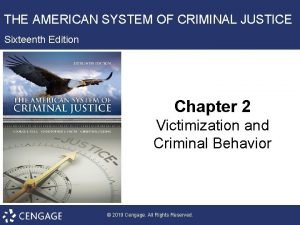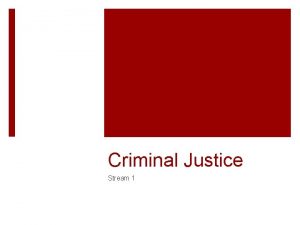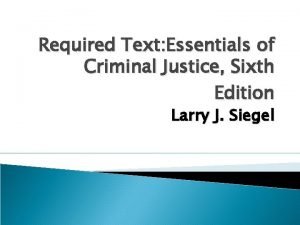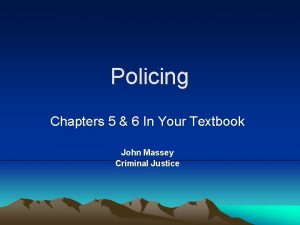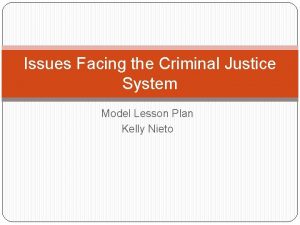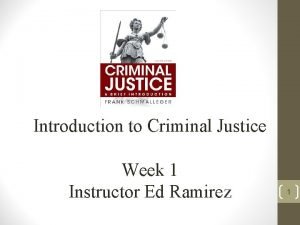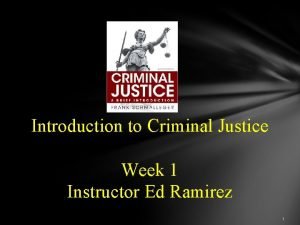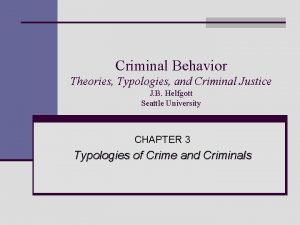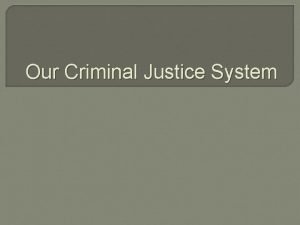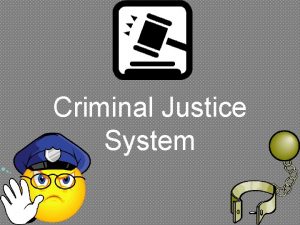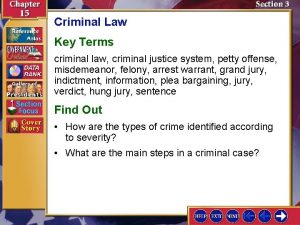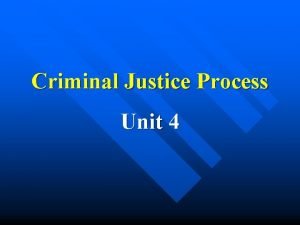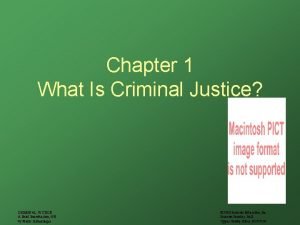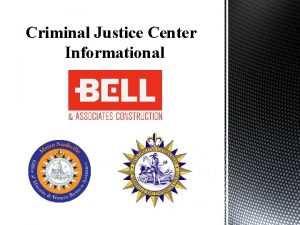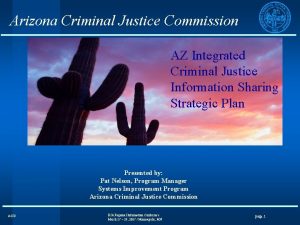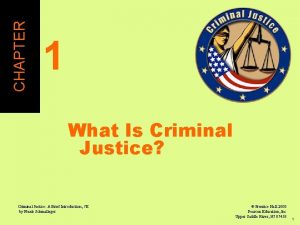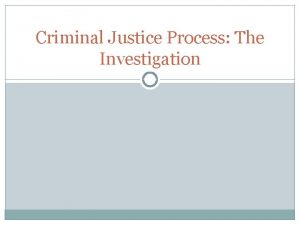No criminal justice system A distinctively American lack
















- Slides: 16

No criminal justice system: A distinctively American lack of centralized policy coordination

What developments and changes will effect crimes reported in press?

The Narrative: State governments attempted to wrest power from local officials and communities and make criminal justice more formal – and the federal government took an increasing interest in criminal justice, creating federal crimes, taking on increased policing and a role as guarantor of civil liberties and civil rights. The result was parallel and overlapping processes operating at local, state and federal levels. § 1865 -1900: State government vs. Popular Justice § 1900 -1920: Progressive Reform & Social Responsibility for Crime § 1920 -WW 2: Crime Control § WW 2 -1970 s: The Liberal Moment § 1970 s to the present: The Severity Revolution

§ New Federal Crimes against Morality: § Mann Act (1910) § Harrison Act (1914) § National Prohibition (1920) § National study of criminal justice: the Wickersham Commission & the ‘third degree’ § fed argument that local administration of criminal justice (legal process not legal definitions) must answer to national constitutional standards § Not until 1950 s/60 s that protections of Bill of Rights extended to accused in state courts § New Federal Crimes and Enforcement (1930 s) § Kidnapping, fugitive felons, interstate theft § FBI to enforce: the most professional law enforcement § Model Penal Code (1960 s): a national criminal law, not nationally adopted


§ New Federal Crimes against Morality: § Mann Act (1910) § Harrison Act (1914) § National Prohibition (1920) § National study of criminal justice: the Wickersham Commission & the ‘third degree’ § fed argument that local administration of criminal justice (legal process not legal definitions) must answer to national constitutional standards § Not until 1950 s/60 s that protections of Bill of Rights extended to accused in state courts § New Federal Crimes and Enforcement (1930 s) § Kidnapping, fugitive felons, interstate theft § FBI to enforce: the most professional law enforcement § Model Penal Code (1960 s): a national criminal law, not nationally adopted

http: //reuther. wayne. edu/node/8262

§ New Federal Crimes against Morality: § Mann Act (1910) § Harrison Act (1914) § National Prohibition (1920) § National study of criminal justice: the Wickersham Commission & the ‘third degree’ § fed argument that local administration of criminal justice (legal process not legal definitions) must answer to national constitutional standards § Not until 1950 s/60 s that protections of Bill of Rights extended to accused in state courts § New Federal Crimes and Enforcement (1930 s) § Kidnapping, fugitive felons, interstate theft § FBI to enforce: the most professional law enforcement § Model Penal Code (1960 s): a national criminal law, not nationally adopted


§ New Federal Crimes against Morality: § Mann Act (1910) § Harrison Act (1914) § National Prohibition (1920) § National study of criminal justice: the Wickersham Commission & the ‘third degree’ § fed argument that local administration of criminal justice (legal process not legal definitions) must answer to national constitutional standards § Not until 1950 s/60 s that protections of Bill of Rights extended to accused in state courts § New Federal Crimes and Enforcement (1930 s) § Kidnapping, fugitive felons, interstate theft § FBI to enforce: the most professional law enforcement § Model Penal Code (1960 s): a national criminal law, not nationally adopted

§ ‘Modern’ criminal courts: § Felony Courts § Greater focus on logic of the law § Greater role for police & medical examiner (not neighbors & politicians) § From local & personal evidence to expert witnesses § Lower Courts § Judges with legal training replace JPs, but few lawyers § Chaotic environment § Going to court brought legal system into lives § Centralized, bureaucratic structures, organized like businesses § Specialized Courts: the Chicago Morals Court § Incorporated psychiatry, medicine & social work into everyday practice


§ ‘Modern’ criminal courts: § Felony Courts § Greater focus on logic of the law § Greater role for police & medical examiner (not neighbors & politicians) § From local & personal evidence to expert witnesses § Lower Courts § Judges with legal training replace JPs, but few lawyers § Chaotic environment § Going to court brought legal system into lives § Centralized, bureaucratic structures, organized like businesses § Specialized Courts: the Chicago Morals Court § Incorporated psychiatry, medicine & social work into everyday practice

§ Judges § Spread of merit plans (33 states at present) § Still elected § Partisan and non-Partisan elections § Prosecutors § Head of office elected; staff appointed § Staff are political appointments – not lawyers into 1930 s § Lack of expertise = role for private groups

§ Sidelining the Jury: § Plea bargaining: in hands of professionals § Bench trials § The persistence of jury nullification: gambling § Modernizing the Police § Into cars, on the radio, off the streets – and out of contact with population § More training: college cops § Militarized § Result: bureaucratic, isolated, inward looking, defensive

§ End of lynching § Establishment of death penalty § African- American campaigns § Rejected by southern elites § Rioting § Reactions to crime § Shifts to reactions to policing
 The american system of criminal justice 16th edition
The american system of criminal justice 16th edition Criminal justice wedding cake
Criminal justice wedding cake Four pillars of criminal justice system
Four pillars of criminal justice system Arizona criminal justice information system
Arizona criminal justice information system Responsibilities of saps in the criminal justice system
Responsibilities of saps in the criminal justice system Mexico criminal justice system
Mexico criminal justice system Franchise amortization
Franchise amortization Cjpp guelph
Cjpp guelph Fran carino juvenile law
Fran carino juvenile law Funnel effect criminal justice
Funnel effect criminal justice Grass eater police
Grass eater police Criminal justice lesson
Criminal justice lesson Consensus model criminal justice
Consensus model criminal justice Consensus model criminal justice
Consensus model criminal justice What is corrections
What is corrections Consensus model criminal justice
Consensus model criminal justice Criminal typology
Criminal typology
